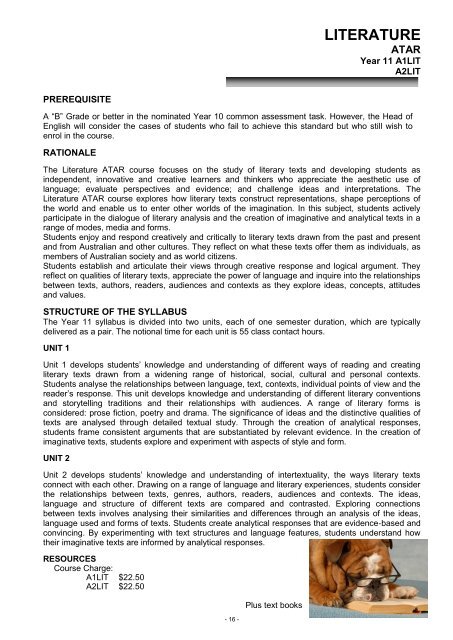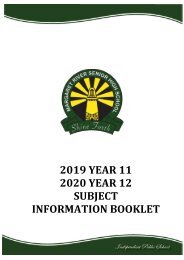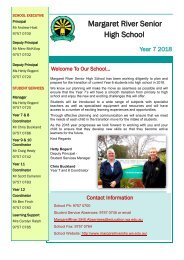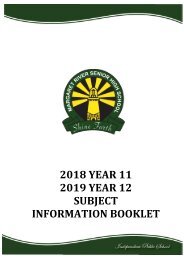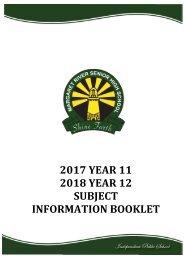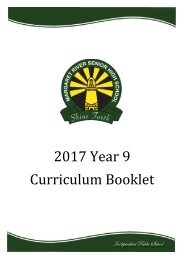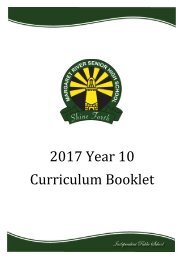2017 Upperschool Course Information
Create successful ePaper yourself
Turn your PDF publications into a flip-book with our unique Google optimized e-Paper software.
LITERATURE<br />
ATAR<br />
Year 11 A1LIT<br />
A2LIT<br />
PREREQUISITE<br />
A ―B‖ Grade or better in the nominated Year 10 common assessment task. However, the Head of<br />
English will consider the cases of students who fail to achieve this standard but who still wish to<br />
enrol in the course.<br />
RATIONALE<br />
The Literature ATAR course focuses on the study of literary texts and developing students as<br />
independent, innovative and creative learners and thinkers who appreciate the aesthetic use of<br />
language; evaluate perspectives and evidence; and challenge ideas and interpretations. The<br />
Literature ATAR course explores how literary texts construct representations, shape perceptions of<br />
the world and enable us to enter other worlds of the imagination. In this subject, students actively<br />
participate in the dialogue of literary analysis and the creation of imaginative and analytical texts in a<br />
range of modes, media and forms.<br />
Students enjoy and respond creatively and critically to literary texts drawn from the past and present<br />
and from Australian and other cultures. They reflect on what these texts offer them as individuals, as<br />
members of Australian society and as world citizens.<br />
Students establish and articulate their views through creative response and logical argument. They<br />
reflect on qualities of literary texts, appreciate the power of language and inquire into the relationships<br />
between texts, authors, readers, audiences and contexts as they explore ideas, concepts, attitudes<br />
and values.<br />
STRUCTURE OF THE SYLLABUS<br />
The Year 11 syllabus is divided into two units, each of one semester duration, which are typically<br />
delivered as a pair. The notional time for each unit is 55 class contact hours.<br />
UNIT 1<br />
Unit 1 develops students‘ knowledge and understanding of different ways of reading and creating<br />
literary texts drawn from a widening range of historical, social, cultural and personal contexts.<br />
Students analyse the relationships between language, text, contexts, individual points of view and the<br />
reader‘s response. This unit develops knowledge and understanding of different literary conventions<br />
and storytelling traditions and their relationships with audiences. A range of literary forms is<br />
considered: prose fiction, poetry and drama. The significance of ideas and the distinctive qualities of<br />
texts are analysed through detailed textual study. Through the creation of analytical responses,<br />
students frame consistent arguments that are substantiated by relevant evidence. In the creation of<br />
imaginative texts, students explore and experiment with aspects of style and form.<br />
UNIT 2<br />
Unit 2 develops students‘ knowledge and understanding of intertextuality, the ways literary texts<br />
connect with each other. Drawing on a range of language and literary experiences, students consider<br />
the relationships between texts, genres, authors, readers, audiences and contexts. The ideas,<br />
language and structure of different texts are compared and contrasted. Exploring connections<br />
between texts involves analysing their similarities and differences through an analysis of the ideas,<br />
language used and forms of texts. Students create analytical responses that are evidence‐based and<br />
convincing. By experimenting with text structures and language features, students understand how<br />
their imaginative texts are informed by analytical responses.<br />
RESOURCES<br />
<strong>Course</strong> Charge:<br />
A1LIT $22.50<br />
A2LIT $22.50<br />
- 16 -<br />
Plus text books


